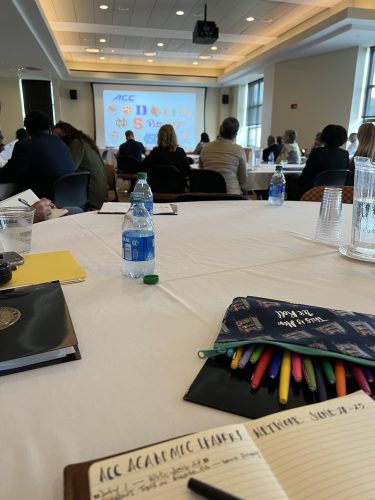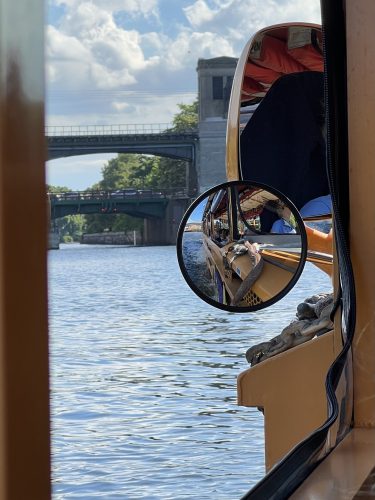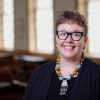Last week I hopped a plane and flew up to Boston College for the second meeting of the 2022 ACC Academic Leaders Network (ALN) leadership development program. It was good to be traveling again, especially by plane (I love flying!), and I was glad to be in parts of Boston I’d not visited before. Boston College is beautiful, with lots of stone buildings that reminded me somewhat of Hogwarts – erm, I mean Oxford – although there was a fair amount of construction near where we met because hey it’s summer on a college campus!
 At our first ALN meeting at Virginia Tech, 70 leaders representing all 15 ACC schools came together to network and learn about our personal leadership styles. This meeting’s focus was on organizational leadership. Our opening session was led by David Quigley, Provost and Dean of Faculties at Boston College, who spoke about the ACC and trends in higher education. He shared interesting demographics about the ACC schools and compared our conference to the other Power 5 conferences: Big Ten, Big 12, Pac-12, & SEC. We are both more diverse in terms of public/private, size, and tuition than the other conferences, and our academic programs rank higher across the board. He touched on how projected enrollment declines in the next 7-10 years will hit unevenly across the ACC from student race & ethnicity to geographic location. Provost Quigley also acknowledged that if SCOTUS strikes down affirmative action in the next term (cases from Harvard and UNC are on the docket for 2022-2023), schools will need to look at other demographics that courts have signaled are OK – e.g., first generation students – to think more creatively about diversifying our student bodies. It was a fascinating, if at times sobering start.
At our first ALN meeting at Virginia Tech, 70 leaders representing all 15 ACC schools came together to network and learn about our personal leadership styles. This meeting’s focus was on organizational leadership. Our opening session was led by David Quigley, Provost and Dean of Faculties at Boston College, who spoke about the ACC and trends in higher education. He shared interesting demographics about the ACC schools and compared our conference to the other Power 5 conferences: Big Ten, Big 12, Pac-12, & SEC. We are both more diverse in terms of public/private, size, and tuition than the other conferences, and our academic programs rank higher across the board. He touched on how projected enrollment declines in the next 7-10 years will hit unevenly across the ACC from student race & ethnicity to geographic location. Provost Quigley also acknowledged that if SCOTUS strikes down affirmative action in the next term (cases from Harvard and UNC are on the docket for 2022-2023), schools will need to look at other demographics that courts have signaled are OK – e.g., first generation students – to think more creatively about diversifying our student bodies. It was a fascinating, if at times sobering start.
The second and third days focused more on specific aspects of leadership with sessions on fostering meaningful work, how gratitude enhances wellbeing, leading through emergencies, taking worthwhile risks, and intersectionality and understanding others. I took pages of notes; here are my key takeaways:
- meaningful work makes employees feel better and work better, but only 34% of U.S. employees report being actively engaged in their work; that said, it’s hard to define “good work” due to lack of standards
- life stage, not generation, is more important to meaningfulness at work
- there are 6 work orientations identified by Michael Pratt, Boston College: utilitarian, status, passion, kinship, service, and craftsmanship; one’s work orientation can change over time; when recruiting, we need to market opportunities so they will appeal to all orientations
- to find more meaningfulness at work without changing jobs, people can practice job crafting by altering approaches to tasks, relationships, and cognitive engagement
- when dealing with emergencies, put messaging into terms people can understand; e.g., tell students they can’t return to campus post-hurricane evacuation because there’s still 1000 Ford F150s of debris to move (not 12,000 cubic feet, which is too abstract and far less catchy)
- taking risks means being courageous and taking actions that involve choice, risk, and a goal; courage and risk can lead to fear but not always
- what is courageous for me may not be courageous for you
- maintaining a sense of self as leaders requires you to name and reclaim your self; have personal mission and vision to anchor and assess what you do so you know why you say “yes”
- when investigating discriminatory practices, ask questions around the complexities: who are they in the time/place/culture where they’re experiencing discrimination?
- don’t commit the sin of generalizing: one person’s discriminatory experience will not be the same as someone else’s, even in the same setting
- find rituals that allow you to pause and rest
 In addition to our sessions, we also had time to work with our cross-institution communities of practice. My community is focused on non-tenure track or fixed term faculty (NTT/FT). We are preparing a report for the ACC that will give a high-level snapshot of NTT/FT at each of our schools – NCSU, Duke, UNC, Miami, Louisville, Syracuse, and Wake – and make a recommendation that all 15 schools conduct a research study to assess NTT/FT job satisfaction and identify best practices for titles, contract lengths, notice & review processes, and governance. It’s been interesting to hear about the range of NTT/FT classifications across schools, and to what level those faculty are and are not able to participate in faculty governance.
In addition to our sessions, we also had time to work with our cross-institution communities of practice. My community is focused on non-tenure track or fixed term faculty (NTT/FT). We are preparing a report for the ACC that will give a high-level snapshot of NTT/FT at each of our schools – NCSU, Duke, UNC, Miami, Louisville, Syracuse, and Wake – and make a recommendation that all 15 schools conduct a research study to assess NTT/FT job satisfaction and identify best practices for titles, contract lengths, notice & review processes, and governance. It’s been interesting to hear about the range of NTT/FT classifications across schools, and to what level those faculty are and are not able to participate in faculty governance.
All in all it was a good meeting. And I thoroughly enjoyed the Friday afternoon Boston Duck Boat tour that our hosts organized. It was a spectacularly gorgeous day to be out around town and a welcome break after a heady day!

5 Comments on ‘Molly at the ACC ALN in Boston’
Thanks for sharing these high level takeaways. It sounds like a fruitful reentry into conference travel!
Glad this is such a good experience — thanks for sharing. I’ll be very interested NTT/NT report.
Thanks for this report, Molly. Sounds like a great conference!
Sounds like you got a lot out of it. Glad you were able to go.
Thanks for your key takeaways and for letting us know about the NTT/FT report!